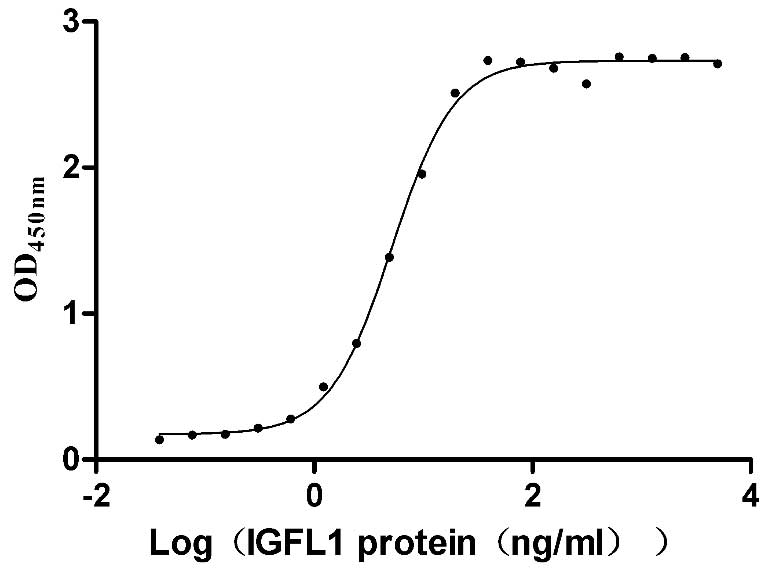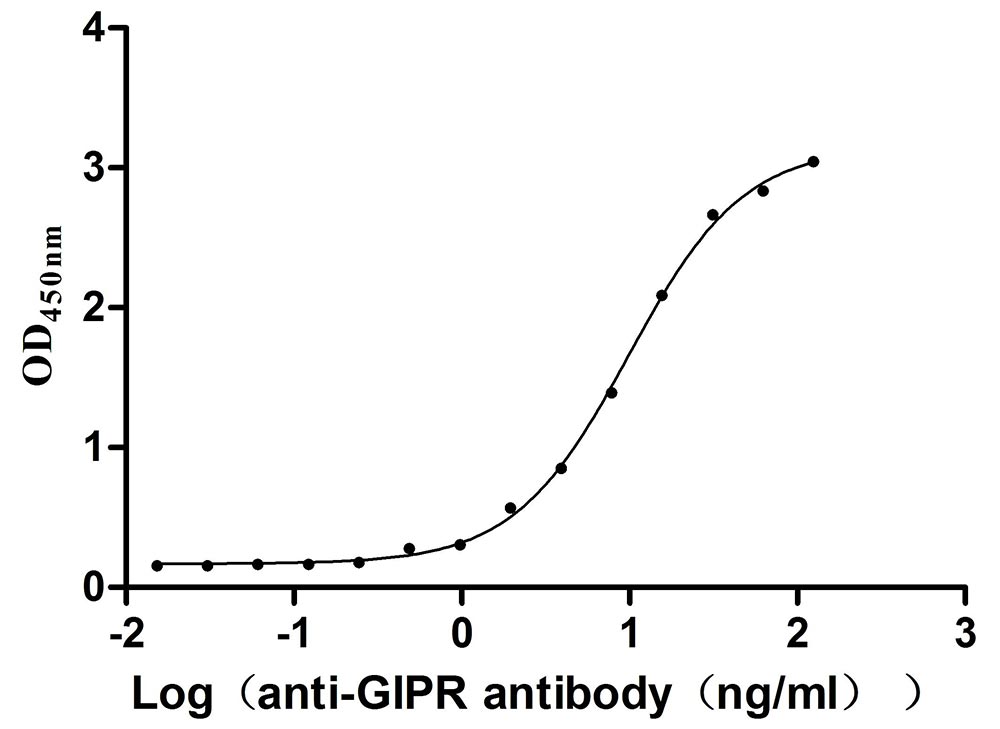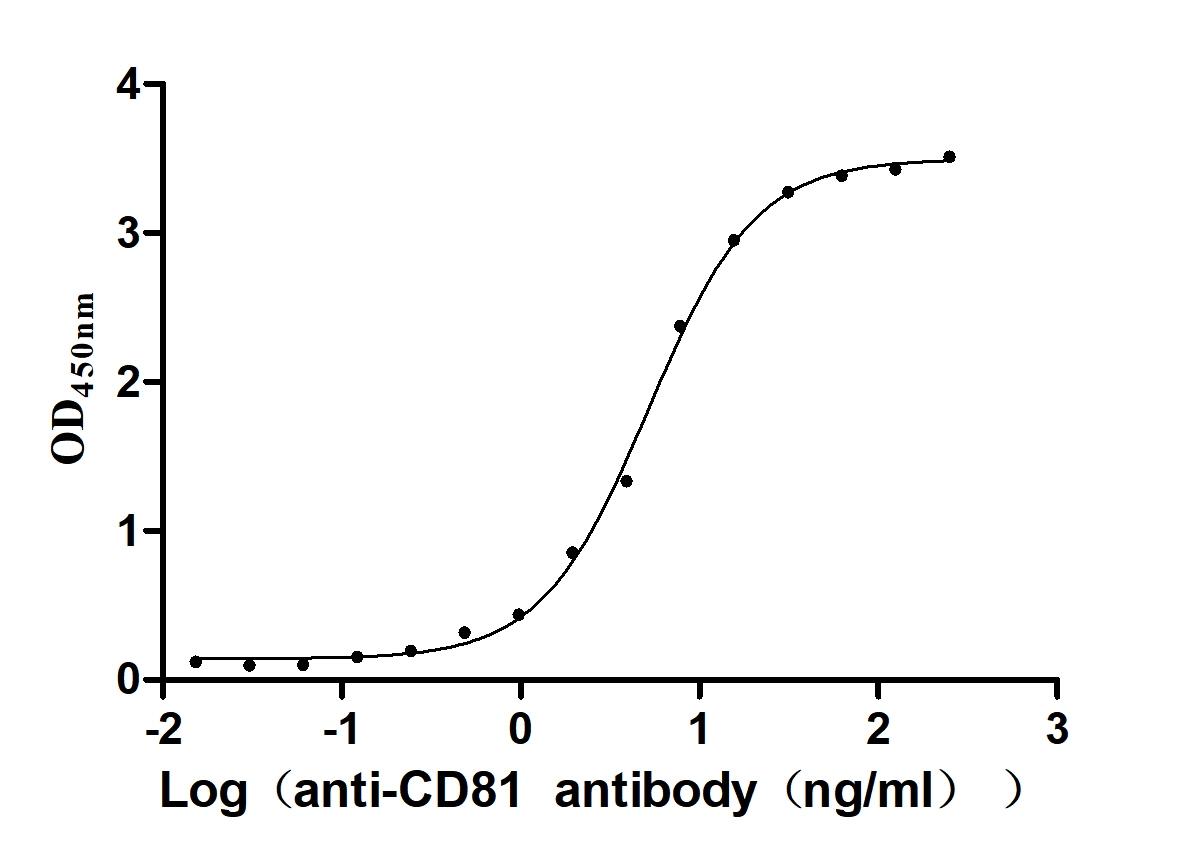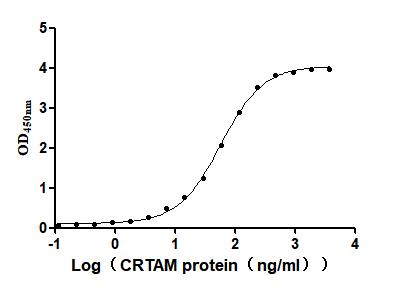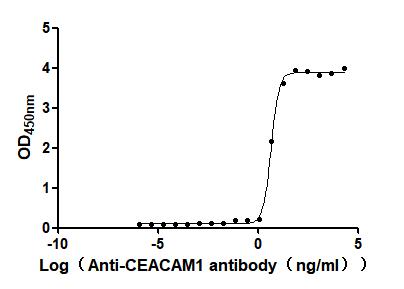Recombinant Epstein-Barr virus Epstein-Barr nuclear antigen 2 (EBNA2), partial
-
货号:CSB-YP319476EFA
-
规格:
-
来源:Yeast
-
其他:
-
货号:CSB-EP319476EFA
-
规格:
-
来源:E.coli
-
其他:
-
货号:CSB-EP319476EFA-B
-
规格:
-
来源:E.coli
-
共轭:Avi-tag Biotinylated
E. coli biotin ligase (BirA) is highly specific in covalently attaching biotin to the 15 amino acid AviTag peptide. This recombinant protein was biotinylated in vivo by AviTag-BirA technology, which method is BriA catalyzes amide linkage between the biotin and the specific lysine of the AviTag.
-
其他:
-
货号:CSB-BP319476EFA
-
规格:
-
来源:Baculovirus
-
其他:
-
货号:CSB-MP319476EFA
-
规格:
-
来源:Mammalian cell
-
其他:
产品详情
-
纯度:>85% (SDS-PAGE)
-
基因名:EBNA2
-
Uniprot No.:
-
别名:EBNA2; BYRF1; Epstein-Barr nuclear antigen 2; EBNA-2; EBV nuclear antigen 2
-
种属:Epstein-Barr virus (strain B95-8) (HHV-4) (Human herpesvirus 4)
-
蛋白长度:Partial
-
蛋白标签:Tag type will be determined during the manufacturing process.
The tag type will be determined during production process. If you have specified tag type, please tell us and we will develop the specified tag preferentially. -
产品提供形式:Lyophilized powder
Note: We will preferentially ship the format that we have in stock, however, if you have any special requirement for the format, please remark your requirement when placing the order, we will prepare according to your demand. -
复溶:We recommend that this vial be briefly centrifuged prior to opening to bring the contents to the bottom. Please reconstitute protein in deionized sterile water to a concentration of 0.1-1.0 mg/mL.We recommend to add 5-50% of glycerol (final concentration) and aliquot for long-term storage at -20℃/-80℃. Our default final concentration of glycerol is 50%. Customers could use it as reference.
-
储存条件:Store at -20°C/-80°C upon receipt, aliquoting is necessary for mutiple use. Avoid repeated freeze-thaw cycles.
-
保质期:The shelf life is related to many factors, storage state, buffer ingredients, storage temperature and the stability of the protein itself.
Generally, the shelf life of liquid form is 6 months at -20°C/-80°C. The shelf life of lyophilized form is 12 months at -20°C/-80°C. -
货期:Delivery time may differ from different purchasing way or location, please kindly consult your local distributors for specific delivery time.Note: All of our proteins are default shipped with normal blue ice packs, if you request to ship with dry ice, please communicate with us in advance and extra fees will be charged.
-
注意事项:Repeated freezing and thawing is not recommended. Store working aliquots at 4°C for up to one week.
-
Datasheet :Please contact us to get it.
相关产品
靶点详情
-
功能:Plays a key role in the activation of the host resting B-cell and stimulation of B-cell proliferation. Acts by up-regulating the expression of viral EBNA1-6, LMP1, LMP2A and LMP2B genes, as well as several host genes including CD21, CD23 and MYC. Activates transcription by acting as an adapter molecule that binds to cellular sequence-specific DNA-binding proteins such as host CBF1, SMARCB1 and SPI1. Once EBNA2 is near promoter sites, its acidic activating domain recruits basal and activation-associated transcription factors TFIIB, TAF40, TFIIH components ERCC2 and ERCC3, and CBP in order to promote transcription. Alternatively, EBNA2 can affect activities of cell cycle regulators and retard cell cycle progression at G2/M phase. It also induces chromosomal instability, by disrupting mitotic checkpoints, multi-nucleation and formation of micronuclei in infected cells.
-
基因功能参考文献:
- Identified three independent domains within EBNA2 that act through species-specific mechanisms. Importantly, the EBNA2 orthologues and species-specific EBNA2 domains separate unique roles for EBNA2 in the initiation of B cell immortalization from those responsible for maintaining the immortalized state. PMID: 29261800
- This study identifies the BS69 C-terminal domains as an inhibitor of EBNA2. PMID: 26845565
- s show that human herpesvirus 4 EBNA2 represses BIK in B-cell lymphoma-derived cell lines and that this host-virus interaction can inhibit the proapoptotic effect of transforming growth factor beta1. PMID: 24554662
- PRMT5 triggers the symmetric dimethylation of EBNA2 RG domain to coordinate with EBNA2-mediated transcription. PMID: 23261437
- present data suggest that EBNA2 might contribute to EBV-induced B-cell transformation by increasing oncomiR-like miR-21 and by affecting the antiviral responses of the innate immune system through downregulation of its key regulator miR-146a PMID: 22614176
- The subtypes E2-A and E2-C were the dominant genotypes of the EBNA-2 gene in nasopharyngeal and gastric carcinomas. PMID: 22348267
- mechanism by which the PhiW PhiP motif of RAM and EBNA2 compete with one another for binding at the hydrophobic pocket of the beta-trefoil domain (BTD) of CSL using overlapping but specific interactions that are unique to each BTD ligand. PMID: 20028974
- Inhibition of methylation in EBV-infected cells results in reduced expression of the EBNA2-regulated viral gene LMP1, evidencing that methylation is a prerequisite for DNA-binding by EBNA2 via association with the transcription factor RBPJkappa. PMID: 19969318
- data implicate EBNA2 Ser243 as a cdc2/cyclin B1 site of phosphorylation important for EBNA2's cotranscriptional function in mitosis PMID: 16439560
- results identify FcRH5 as a novel, direct target of EBNA2 that may contribute to the development of Epstein-Barr virus-associated tumors (Epstein-Barr virus nuclear antigen 2) PMID: 16439682
- EBNA2 trans-activates bfl-1, which requires CBF1 (or RBP-J kappa). PMID: 16873269
- p55alpha is thus a functional target of EBNA2 in EREB2.5 cells PMID: 16963743
- broad spectrum of EBNA-2 functions involved in virus-host interactions, including cell signaling molecules, adapters, genes involved in cell cycle regulation, and chemokines PMID: 16973580
- In EBV-negative diffuse large B-cell lymphoma and Burkitt lymphoma-derived cell lines infected in vitro with a recombinant EBV, high expression of EBNA2 inversely correlated with expression of germinal center-associated genes, BCL6 and TCL1. PMID: 17151114
- results indicate that differential gene regulation by Epstein-Barr virus type 1 and type 2 EBNA2 may be the basis for the much weaker B-cell transformation activity of type 2 Epstein-Barr virus strains compared to type 1 strains. PMID: 18480445
- EBNA2 is a transcriptional coactivator of STAT3 by influencing its DNA-binding activity. PMID: 19032945
- EBNA2 was shown to be able to downregulate mitotic arrest deficient 2 (MAD2) approximately 2- to 3-fold and upregulate polo-like kinase 1 (PLK1) approximately 2-fold. PMID: 19126642
- Both EBNA2 and Notch-IC induced the expression of proapoptotic genes, but only in EBNA2-expressing cells were antiapoptotic genes strongly up-regulated. PMID: 19339697
显示更多
收起更多
-
亚细胞定位:Host nucleus matrix. Note=Associated with the nuclear matrix.
-
蛋白家族:Herpesviridae EBNA2 family
-
数据库链接:
KEGG: vg:3783761
Most popular with customers
-
Recombinant Human Membrane cofactor protein (CD46), partial (Active)
Express system: Mammalian cell
Species: Homo sapiens (Human)
-
Recombinant Human IGF-like family receptor 1 (IGFLR1), partial (Active)
Express system: Mammalian cell
Species: Homo sapiens (Human)
-
Express system: Mammalian cell
Species: Macaca fascicularis (Crab-eating macaque) (Cynomolgus monkey)
-
Recombinant Mouse Gastric inhibitory polypeptide receptor (Gipr), partial (Active)
Express system: Mammalian cell
Species: Mus musculus (Mouse)
-
Recombinant Human CD81 antigen (CD81), partial (Active)
Express system: Mammalian cell
Species: Homo sapiens (Human)
-
Recombinant Mouse Cytotoxic and regulatory T-cell molecule (Crtam), partial (Active)
Express system: Mammalian cell
Species: Mus musculus (Mouse)
-
Recombinant Human Carcinoembryonic antigen-related cell adhesion molecule 8(CEACAM8) (Active)
Express system: Mammalian cell
Species: Homo sapiens (Human)
-
Express system: Mammalian cell
Species: Homo sapiens (Human)



